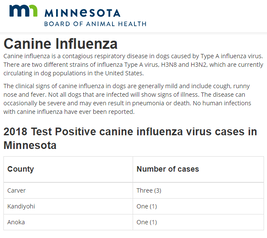When a sneeze is more than a sneeze...

You may have heard about the recent concerns about Canine Influenza, which is now present in Minnesota. We wanted to take a minute to provide you with the latest information, and how this may impact you and your pets.
According to the Minnesota Board of Animal Health, symptoms can include, but are not limited to: not eating, vomiting, coughing, fever, nasal discharge, and sneezing. The University of Minnesota advises that Canine Influenza “is most likely spread between dogs by aerosol droplets (coughing) or by a dog’s direct contact with contaminated surfaces. It is possible for an infected dog to have no outward signs of infection yet actively shed the virus.”
To date, there are no reported cases of transmission to humans, although in some cases cats may be at risk. Risk factors for contracting Canine Influenza include going to dog parks, boarding facilities, grooming facilities, or other places where there is a high concentration of dogs. Just like we as humans receive an annual flu vaccine, a Canine Influenza Vaccine is now available. There is no Influenza vaccine currently approved for cats. We recommend that you consider vaccinating for Canine Influenza if your dog is in high risk situations.
As always, if you have any questions or concerns, please contact us at 651-452-5156 anytime.
The following links provide more detailed information on Canine Influenza:
American Veterinary Medical Association Canine Influenza Fact Sheet
https://www.avma.org/KB/Resources/Reference/Pages/Canine-Influenza-Backgrounder.aspx
Minnesota Board of Animal Health Canine Influenza Fact Sheet
https://www.bah.state.mn.us/dogs-cats/?utm_medium=email&utm_source=govdelivery#canine-influenza
According to the Minnesota Board of Animal Health, symptoms can include, but are not limited to: not eating, vomiting, coughing, fever, nasal discharge, and sneezing. The University of Minnesota advises that Canine Influenza “is most likely spread between dogs by aerosol droplets (coughing) or by a dog’s direct contact with contaminated surfaces. It is possible for an infected dog to have no outward signs of infection yet actively shed the virus.”
To date, there are no reported cases of transmission to humans, although in some cases cats may be at risk. Risk factors for contracting Canine Influenza include going to dog parks, boarding facilities, grooming facilities, or other places where there is a high concentration of dogs. Just like we as humans receive an annual flu vaccine, a Canine Influenza Vaccine is now available. There is no Influenza vaccine currently approved for cats. We recommend that you consider vaccinating for Canine Influenza if your dog is in high risk situations.
As always, if you have any questions or concerns, please contact us at 651-452-5156 anytime.
The following links provide more detailed information on Canine Influenza:
American Veterinary Medical Association Canine Influenza Fact Sheet
https://www.avma.org/KB/Resources/Reference/Pages/Canine-Influenza-Backgrounder.aspx
Minnesota Board of Animal Health Canine Influenza Fact Sheet
https://www.bah.state.mn.us/dogs-cats/?utm_medium=email&utm_source=govdelivery#canine-influenza






